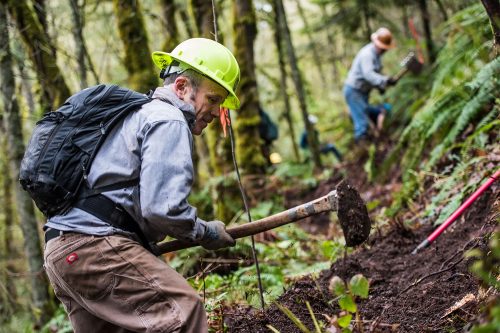
After living in the Thurston Hills for more than 20 years, Kebrhea Cuellar wasn’t exactly shocked to hear that the Bureau of Land Management was once again attempting to sell off nearly 100 acres of timber to a lumber company, timber on land that Cuellar — and many others — consider their backyard.
“I didn’t think the BLM would find this 100 acres, which is practically in the suburbs, worth the fight and loss of public trust,” Cuellar says. “But I also wasn’t surprised, because the BLM has shown, through their persistence with this sale, that they have no regard for the many people in the area and the negative impacts it would have on our community.”
The Pedal Power project and its ensuing timber sale were put on hold in September 2019 after a federal judge ruled that the BLM had not fully disclosed to neighboring residents the potential for wildfires from logging.
The judge ordered the BLM to re-do its environmental review, making sure to include the increase in fire danger. The agency must also provide a “recreation management zone” before any logging can occur.
Cascadia Wildlands was one of two local environmental groups behind last year’s lawsuit, which successfully proved that the BLM hadn’t taken into consideration the safety of neighboring property when it comes to wildfires. Sam Krop of Cascadia Wildlands says that wasn’t the only reason the courts turned down the sale.
“The BLM was planning to essentially clearcut over newly designated recreation trails without a buffer,” Krop says. But now, she adds, “unfortunately, due to a convoluted mess of bureaucracy, the BLM was able to add more information about the impact of fire to their analysis and basically reintroduce the exact same proposal, which is what we’re looking at now.”
On Feb. 11, 2019, Seneca timber announced its purchase of the Pedal Power timber. Under that sale, only 92 of the 394 acres will be clearcut, and an untouched buffer area is required around streams and neighboring property.
According to the press release, Seneca paid more than $1 million for the timber. Under the contract, Seneca would pay BLM to be able to log the public land about eight miles southeast of downtown Springfield. The BLM then plans to create nine miles of new trails through Willamalane Park and the surrounding areas.
“Nobody wants to hike next to a clearcut,” Cuellar says. “Not to mention, this plan would undermine the many efforts that have gone into restoring this area and preserving it for the public’s enjoyment.”
While Seneca’s announcement says that plan now includes neighborhood buffers of untouched forest, Krop and other environmental activists insist that it’s basically the same plan that had been turned down by the courts in September, except with more information about fire hazards. To Krop, it still fails to address the concerns of neighbors, who BLM admits will be at increased risk of fire.
“We do a lot of work around fire safety and what real forest management looks like,” Krop says. “And this is definitely not it.”
In preparation for the project, the BLM has partnered with local businesses, which have expressed excitement at the prospect of a new trail system. Willamalane and the mountain bike club Disciples of Dirt have both co-signed on the project, according to Seneca’s press release. Eugene Weekly has reached out to them for comment.
Still, neighbors are worried.
“My family and I live in the Thurston area, close by the planned logging off 69th Street,” Sue Hartman says. “It would put more logging trucks on Highway 126, which is a dangerous road already, and wildfires are a very serious threat because seedling trees are like gas cans — they are very flammable.”
Krop says that the best thing community members can do is send a comment to the BLM. The comment period ends March 5.
“That sounds kind of scary to some people, but it’s as simple as sending an email,” Krop says. “Say ‘I don’t support clear cutting in public land recreation areas or in the backyards of my neighbors.’”
Cascadia Wildlands’ website, CascWild.org, has a form to fill out to help people make a comment and send it to the BLM.
This story has been updated.